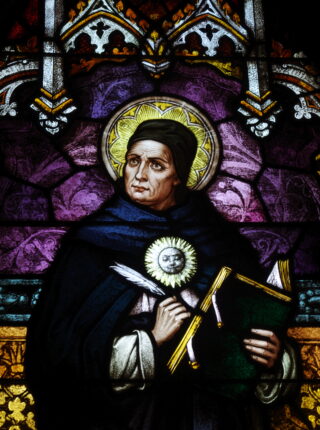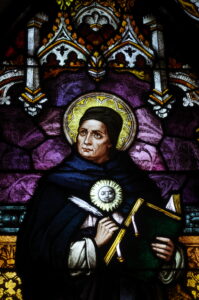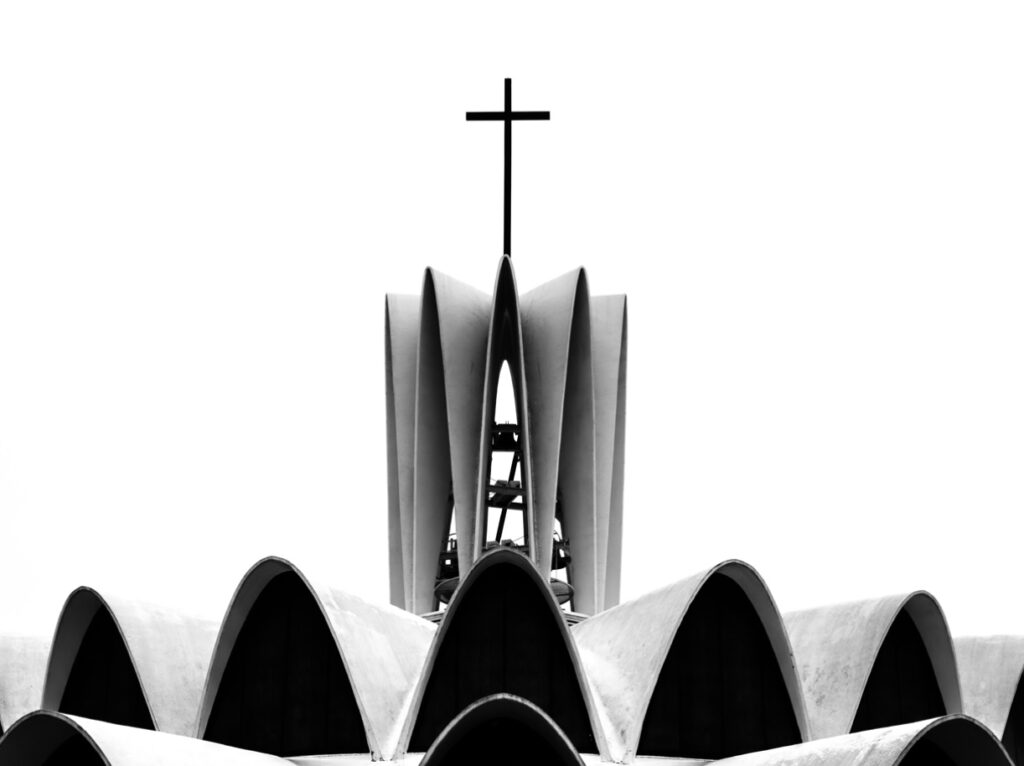Abortion in the Catholic Conscience

To be a Catholic in the United States is to know that official Roman Catholic Church teaching often causes frustration with church leadership. This is usually not about issues that are central to the faith like the various elements of the creed, but about stickier moral matters like Communion for the divorced and remarried, same-sex marriage, capital punishment, women’s ordination — the list can go on. While official teaching on questions like these may be clear, for many Catholics that’s not the end of the matter. Most Catholics are taught that we must always obey our conscience. In these moral matters, our conscience may disagree despite efforts to make peace with official church teaching. Here, I unpack some aspects of church tradition around conscience generally, then about one of the most contentious Catholic topics in our day: abortion.
Conscience
In his letter to the Romans, Paul writes of conscience as reflecting a law written on our hearts, a theme that was picked up in the Vatican II pastoral constitution Gaudium et Spes:
“In the depths of [our] conscience, [we] detect a law which [we do] not impose upon [ourselves], but which holds [us] to obedience. … For [we have in our] heart a law written by God; to obey it is [our] very dignity; according to it [we] will be judged. [Our] conscience is [our] most secret core and sanctuary. There [we are] alone with God, whose voice echoes in [our] depths. In a wonderful manner conscience reveals that law which is fulfilled by love of God and neighbor.”
This is a rich passage: While decisions of conscience are intrinsically matters of reason, there is a profound spiritual resonance in Catholic teaching on conscience. In conscience, we strive to hear that echoing voice of God and respond to it in the moral questions of our lives. Our ongoing practice in discerning and acting is our work as disciples of Jesus.
Decisions of conscience are our best understanding of how God is calling us, here and now, in the particular situations of our lives. Further, conscience does not concern only acts that we do or fail to do, but is about the kind of people we strive to be and to become in light of our most deeply held values. Conscience calls us to justice, to courage, to solidarity with the poor and outcast. We must never violate our conscience. Here’s why: If after diligent prayer, thought, study, and consultation, our conscience tells us one thing, then acting otherwise is to go against what we believe is our best interpretation of God’s voice echoing in our depths. Going against our conscience is always a sin — it always disrupts our relationship with God to violate conscience. Likewise, it is always wrong to order or force someone else to violate their conscience.
Here’s the catch: None of us has direct, unmediated access to the mind of God. And since conscience is a rational process of interpreting and applying the call we hear, we can also make mistakes in moral reasoning. Or we can make mistakes of fact about a situation at hand. So here we are: obliged to obey conscience, even though we know we can be wrong.

This is where formation of conscience enters. A well-formed conscience is better at determining the morally right course of action and is eager to seek that truth. Forming conscience involves more than getting better at the nuts and bolts of moral reasoning. Formation of conscience is a matter of growing into our lives as disciples of Jesus.
How do we start? There are a host of resources for formation of conscience, but I can only offer here a brief list to consider: prayer; study of Scripture; study of science, history, and philosophy; imagination, including the arts; practices of social justice that reorient our moral vision in line with that of Jesus; pondering the witness of saints — official and unofficial — who show us the way of Christ. The church’s official teaching claims a privileged place in the Catholic moral repertoire, too, since it represents our community’s discernments across the centuries. Know what the church hierarchy teaches — but also know why and in what context those teachings arose, because often throughout history important teachings have changed.
The formation of conscience is not an individual or isolated process, but one undertaken in community. Our spiritual lives are communal: We gather to pray, to study, to encourage and persuade one another on the right course of action, especially on difficult questions. Conscience formation is a reciprocal process — we form and are formed in dialogue with others. In the chapter on conscience in Ronald Hamel’s and Kenneth Himes’ 1989 Introduction to Christian Ethics, Bernard Häring writes that
“the uniqueness and creativity of conscience is not just for one’s own sake; it is for co-humanity in and for the reciprocity of consciences. Hence, discernment concerns the common good in Church and society, and the good of each of our fellowmen. … We have to listen to the prophets even if they shake us and unmask our errors” (270).
Sometimes, official church teaching is presented to Catholics as binding on their consciences, that to oppose official teaching is proof that one’s conscience is not rightly formed. There are central teachings of the faith, certainly, and disagreement with those do place one outside the church. For example, if a person does not believe in God, or thinks Jesus was a notable moral teacher but not God’s begotten Son, then they dissent on definitions that are central to Catholic identity. But much of the time moral squabbles about church teachings are about matters on which there is significant doubt, or about which people of goodwill disagree. This isn’t a new problem: Deep in Catholic teaching exist tools for wrestling with doubtful or contested issues. Two of these are epikeia and probabilism.
Rooted in the work of Aristotle, epikeia, which is Greek for “reasonableness,” presumes that the intention of a lawmaker is to serve justice — where obeying a rule or law would create injustice, the just person disobeys, serving both justice and the (presumed) intention of the lawmaker to legislate for the common good. Thomas Aquinas uses this example: If a madman lends his sword to another, then demands it back when in a fit of murderous rage, epikeia demands that the sword not be returned. The rule about returning goods to their owners on request is usually just, but not in this kind of situation. A more contemporary example might be whether one must stay with an abusive spouse: Usually it’s a good idea to try to sustain a relationship that we promised would last our whole lives. However, when one partner abuses the other, then justice and an eye for the common good demand that we break the usually good rule in the name of self-defense or the defense of children. The rule does not apply.
Probabilism recognizes that in some complex moral questions, there is more than one reasonable stance, and says that one’s conscience is free to hold any probable opinion, that is, one that is supported by knowledgeable parties or strong arguments. Probabilism shines when there is legitimate pluralism on a moral question, and perhaps especially where moral questions are developing as a matter of increasing knowledge or, sometimes, when under-recognized voices are finally being heeded. What is probable, then, can change over time — while it may once have been reasonable to doubt anthropogenic climate change, the scientific evidence is now sufficiently strong that climate change denialism is no longer sensible.
These tools for difficult questions recognize that moral issues may not be simple, straightforward, or settled once and for all. These are resources in Catholic theology that recognize the dynamism and complexity of moral life. They help us work through times and situations in which it can be hard to make out that voice that echoes in our depths.
Abortion
Catholic magisterial teaching on abortion is very clear: Direct, intended termination of pregnancy from conception is condemned. The central issue in Catholic tradition is the question of the moral status of the embryo: When is a developing embryo to be considered a person, a bearer of rights, including a right to life?
This question has had a complicated history in Catholic tradition. For example, before the discovery of the mammalian egg in the 19th century, there was no clear understanding that the woman provided much to the developing embryo beyond nourishment. “Quickening” (the point at which the woman becomes aware of fetal movement) was used as a marker for personhood by a number of pre-modern Christians, including Aquinas (Summa Theologiae II-II, q. 64, a. 8, a.d 2). Some early church teaching also connected abortion to concealing sexual sin or regarded it as equivalent to killing babies by exposing them to the elements. In the contemporary era, ethicists propose various developmental markers like individuation (the point after which an embryo can no longer split into twins or combine with another embryo into a single organism), implantation into the uterus, a fetal heartbeat (about 10 weeks’ gestation), or viability outside the uterus as reasonable markers for declaring fetal personhood.
These different stances demonstrate that fetal personhood is ultimately a philosophical determination, while biological development is a continuum from fertilization on, with several points as reasonable markers for personhood. The Congregation for the Doctrine of the Faith made the distinction between the biological continuum development and the philosophical line of personhood explicit in its 1974 Declaration on Procured Abortion:
“There is not a unanimous tradition on [when a fetus becomes a human person] and authors are as yet in disagreement. For some it dates from the first instant; for others it could not at least precede nidation. It is not within the competence of science to decide between these views, because the existence of an immortal soul is not a question in its field. It is a philosophical problem.”
The footnote defends regarding the early embryo as a person from conception, a defensible — but not the only defensible — stance. No subsequent Vatican document has authoritatively taught the personhood of the early embryo, despite declaring that biology makes such a stance compelling. Despite this nuance, abortion is utterly condemned: Gaudium et Spes declared that “abortion and infanticide are unspeakable crimes” (para. 51).
In canon law, procuring abortion imposes latae sententiae excommunication on the responsible parties. That is, they are excommunicated by the act itself, and until they seek absolution, are excluded from the sacraments. Some exceptions, — being too young to be morally responsible, being mentally ill, or acting out of compulsion or great fear — mitigate the person’s moral responsibility, but not the wrongness of the act itself, which is regarded as intrinsically evil (never justifiable under any circumstances) and gravely immoral.
Finally, since magisterial teaching focuses on personhood, there is no logical exception for cases of rape or incest, since neither crime against the mother affects the moral status of the fetus. In his 1995 encyclical Evangelium Vitae, Pope John Paul II also ruled out considerations like a mother’s “desire to protect certain important values such as her own health or a decent standard of living for the other members of the family” (no. 58). He declares that “in no way could this human being ever be considered an aggressor, much less an unjust aggressor!” thus apparently ruling out self-defense claims aside from those justified under the terms of double effect. Canon law would make cases of self-defense matters of lesser penalties than excommunication, but still regard abortion in cases in which the mother’s life is threatened a matter of grave evil, even if not a matter of latae sententiae excommunication.
First, magisterial teaching can never displace the role of conscience. It is with our decisions of conscience that we stand before God, after all, and appealing to authority never supplants the moral maturity that conscience demands. Aquinas made this clear when he said that if your conscience puts you at odds with the official teaching of the church, it was better to die excommunicated than to violate conscience.
Second, listen to both sides with love. Catholics, regardless of how they feel about abortion, might all agree that no one should be forced by economic or other social forces into abortion. Catholic social teaching, with its emphasis on special care for the poor, should be a resource for both sides.

Third, it’s past time that we examine the gaps in magisterial teaching on abortion. Most glaringly, magisterial teaching downplays (or for Pope John Paul II, discounts) the woman involved. The very nature of pregnancy requires a more subtle theology of pregnancy than we have and a more pastoral approach to abortion.
Fourth, remember epikeia. While Catholic tradition would not allow abortion to be regarded as a trivial choice — still there are times when justice requires us to affirm the rightness of terminating a pregnancy. Situations of rape or incest might be considered here. The question of maternal well-being and risk, physical and mental, should never be ignored in a truly Catholic approach to abortion because women are part of the common good. Further, probabilism recognizes that some complex moral questions inspire more than one reasonable stance. One’s conscience is free to hold any probable opinion — that is, one supported by knowledgeable parties or by strong arguments. The profound Catholic division on abortion indicates that there is more than one reasonable stance in play.
Fifth, remember the reciprocity of conscience. Open and respectful dialogue on difficult questions is hard in polarized times, but worth it. The flood of articles after the Supreme Court overturned Roe v. Wade telling how abortion restrictions threatened women’s lives and health, even women with health conditions unrelated to pregnancy or whose pregnancies were medically doomed, highlighted one side of an emerging conversation in which reasonable people can learn from each other. These dialogues are opportunities for insight on all sides. Hurling charges across protest lines simply hardens our hearts and those of the people we oppose. We would do well to emulate the nonviolent resistance of the Civil Rights Movement in the U.S. and speak the truth in love. After all, conscience formation is growth in discipleship. It does not mean that we abandon what we believe to be true — that would violate conscience — but that we aim for a community of love even — perhaps especially — in wrestling the hard questions.



